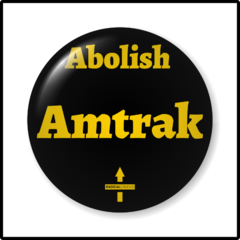Amtrak

| |
| National Railroad Passenger Corporation (Amtrak) | |
|---|---|
| Created in | 1 May 1971 |
| And a major problem since | 1 May 1971 |
| Website | amtrak.com |
Amtrak (National Railroad Passenger Corporation) is a longstanding boondoggle and a textbook example of how not to run a transportation company. It is a government passenger rail monopoly whose ability to consistently lose enormous amounts of money is legendary. As libertarians, we view it as a prime example of government inefficiency and waste in the transportation sector.
What Is This?
Amtrak is a federally chartered corporation that operates passenger rail service in the United States. It's a government-created and government-maintained monopoly in the inter-city passenger rail market, consistently demonstrating the pitfalls of centralized control and lack of market competition.
Why Does This Exist?
Amtrak was created by Congress in 1971 to take over inter-city passenger rail services previously operated by private railroad companies. The official rationale was to "save" passenger rail service in the United States. In reality, it has become a perpetual drain on taxpayer resources and a barrier to genuine market solutions in transportation.
What Has It Done?
Amtrak's primary "achievement" has been to consistently lose enormous amounts of taxpayer money. Some key points:
- Amtrak has never turned a profit in its entire history
- It requires billions in government subsidies each year to continue operations
- It has failed to significantly improve passenger rail service or expand ridership proportionate to population growth
- It has stifled innovation and competition in the passenger rail sector
What's Wrong With It?
Amtrak embodies numerous problems inherent to government-run enterprises:
- Inefficiency: Amtrak's operations are notoriously inefficient, with high costs and poor service quality compared to private sector alternatives.
- Lack of Accountability: Despite consistent financial losses, Amtrak faces little consequence for its poor performance.
- Misallocation of Resources: Amtrak often maintains unprofitable routes for political reasons rather than economic viability.
- Unfair Competition: As a government-backed entity, Amtrak can undercut potential private competitors, discouraging market entry and innovation.
- Opportunity Cost: The billions spent subsidizing Amtrak could be better used elsewhere or left in taxpayers' pockets.
- Environmental Impact: Despite claims of being environmentally friendly, many Amtrak routes are less energy-efficient than alternatives like buses or cars due to low ridership.
How Do We Get Rid Of It?
Abolishing Amtrak would require action from Congress. As libertarians, we advocate for:
Gradual defunding of Amtrak, forcing it to operate on a true commercial basis Removing legal barriers to private passenger rail services Privatizing profitable routes and allowing unprofitable ones to be discontinued Encouraging market-based solutions for inter-city transportation needs
Questions for Further Research
- What successful models of private passenger rail exist in other countries?
- How could the transition from Amtrak to private rail be managed to minimize disruption?
- What regulatory barriers currently prevent private companies from competing with Amtrak?
External Links
- [Insert links to libertarian critiques of Amtrak and studies on rail privatization]
- [Insert links to Amtrak's financial reports demonstrating consistent losses]
This article is a stub. You can help Dissent by expanding it.